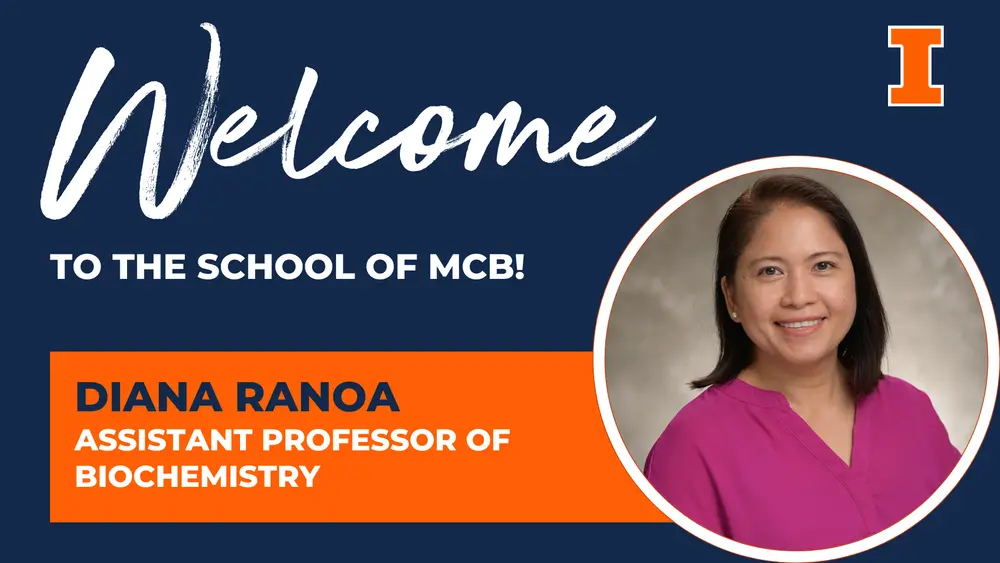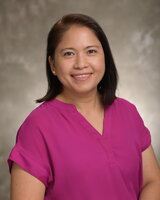
The School of Molecular & Cellular Biology and Department of Biochemistry are pleased to welcome Dr. Diana Ranoa as assistant professor of biochemistry. Dr. Ranoa joins us in November 2024.
Tell us about your lab and your research focus, including how you came to choose or specialize in this area.
The two major goals of my lab are to: 1) define chimeric antigen receptor (CAR)-T cell-mediated mutual reprogramming of tumor and host immune cells in the tumor microenvironment; and 2) engineer next generation of T cell-based therapeutics to improve efficacy against solid tumors.
Tumor heterogeneity poses a huge barrier to effective immunotherapy. It fosters tumor evolution and reprogramming of the tumor landscape, which could lead to drug resistance, treatment failure, and tumor metastasis. When and how tumor-specific CAR-T cells differentiate to a dysfunctional state over time remain incompletely understood. This underscores the need to have a better understanding of the dynamics of interaction among adoptively transferred CAR-T cells, the disseminated tumors, and the resident/infiltrating host immune cells. Using syngeneic murine tumor models that mimic advanced stages of cancer in human patients, my lab will investigate CAR-T cell and host immune responses over the course of tumor progression.
We aim to develop a deep mechanistic understanding of the spatiotemporal and molecular factors that define pathways of resistance to CAR-T based therapies as well as determine the molecular mechanisms responsible for altering the functional states of host immune cells in the tumor. By understanding the dynamics of interaction in the tumor microenvironment, we can engineer the next generation of CAR-T cells to be able to overcome immune suppression in solid tumors, improve its therapeutic efficacy both as a single agent and in combination with other treatment modalities, and reduce its adverse side effects.
I became fascinated with immuno-oncology and how we can harness the host immune system to fight cancer during my postdoctoral studies at the University of Chicago and here at the University of Illinois Urbana-Champaign. As a postdoctoral scholar in radiation oncology at the University of Chicago under the supervision of Prof. Ralph R. Weichselbaum, I contributed to understanding the cell-intrinsic responses of human/murine tumor cells to ionizing radiation and how this affects host immune responses. As a research fellow at the Carl R. Woese Institute for Genomic Biology, within the Anticancer from Pets to People (ACPP) Theme, working collaboratively with Professors David M. Kranz and Paul J. Hergenrother, we developed CAR-T cells targeting advanced stages of ovarian tumors established an immunocompetent murine model. We demonstrated that CAR-T cells engineered to have higher affinity towards their tumor target were able to significantly delay tumor progression, even when administered to mice with already established, disseminated tumors.
However, while we have shown that CAR-T cells persisted for months, allowing CAR-treated mice to delay tumor growth in a tumor re-challenge setting, mice eventually succumbed to the disease, suggesting that the tumors have employed immune-evasive strategies that either made them invisible to the CAR-Ts or made the CAR-Ts dysfunctional over time. Thus, there is a need to understand the molecular interactions happening in vivo and develop different combination treatment strategies to enhance CAR-T cell efficacy against solid tumors.
What is especially exciting about this particular area of research, at this time?
Chimeric antigen receptor (CAR)-T cells are modified adoptively-transferred T cells classified as “living drugs” that are highly specific towards their tumor target. The current arsenal of U.S. Federal Drug Administration-approved CAR-T cells have been considered game changers for a growing number of cancer patients that have received this treatment, but are limited to those with hematopoietic cancers. For solid tumors, several challenges have to be overcome by CAR-T cells, which include antigen specificity, antigen escape, trafficking and infiltration into tumors, persistence in the host, and adverse side effects. My lab has developed the tools necessary to study these, in addition to technological advances in single cell RNA sequencing and in vivo imaging that will allow us to dissect the spatio-temporal molecular mechanisms regulating T cells in tumors and the subsequent re-shaping of the tumor microenvironment landscape.
What interested you the most about becoming a faculty member in the School of Molecular and Cellular Biology and the University of Illinois?
The diversity of expertise and the multi-cultural composition of the faculty and students here at U. of I. are what attracted me the most to this institution. Being able to seek out the opinions and guidance of eager professors and research scientists who are experts in their own fields as well as listen to their various perspectives allows us to tackle huge problems such as fighting cancer from different angles through fruitful collaborations.
What are your teaching interests?
I am interested in teaching within an area that spans the field of cancer, immunology, and molecular biology. Immuno-oncology is a rapidly evolving field, and to be able to keep up, we have to learn and understand the various experimental approaches and technological advances that will enable us to answer complex scientific questions.
If any students (undergrad or grad) are interested in working in your lab, what’s your advice or how can they get in touch with you?
Interested students may contact me at dranoa2@illinois.edu or stop by my office at Burrill Hall (BH) 352.
Tell us about someone who made a difference in your life, such as someone who sparked your interest in biology, who encouraged you to pursue a career in academia or challenged your thinking about a topic.
All the mentors that I’ve had the opportunity to work with helped shaped me into who I am today. My undergraduate mentor from the Philippines, Prof. Cynthia T. Hedreyda, encouraged me to pursue grad school here in the US. My grad school mentor, Prof. Richard I. Tapping, ignited my interest in immunology. My postdoc mentors Profs. Ralph R. Weichselbaum, Paul J. Hergenrother, and David M. Kranz gave me the freedom to carve my own research path, provided a welcoming lab environment, allowed me to explore complex scientific questions, offered insightful comments, suggestions, and moral/financial support, and last but definitely not the least, instilled the value of team-based science and the importance of maintaining a good collaborative environment amongst my colleagues.
What do you like to do in your free time?
I love to travel and explore the outdoors. I enjoy activities such as hiking, canyoneering, rock climbing, and any water-related activities such as swimming, SCUBA diving, snorkeling, kayaking, and wind-surfing.
